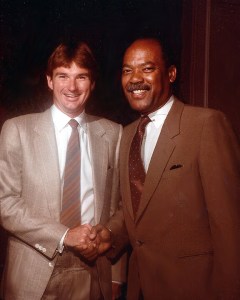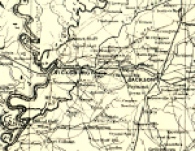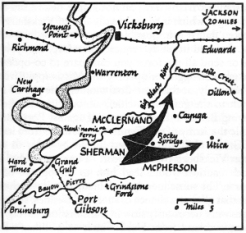This heartfelt essay is the introduction to The Yazoo River by Frank E. Smith, the forty-seventh volume in The Rivers of America, a landmark series of books for the most part written by literary figures. The series spanned three publishers and thirty-seven years, starting in 1937 and ending in 1974 with the sixty-fourth volume.

“It was Smith’s refusal to ‘race it up’ in his 1962 campaign that paved his way to defeat,” reporter Robert E. Baker later wrote in The Washington Post. Bowing to political reality, Smith knew “he could not participate in the vital field of human relations as a legislator,” Baker wrote in a 1964 review of Rep. Smith’s memoir, Congressman from Mississippi.”
“I had a problem,” Smith said, “but it did not reach momentous proportions until internationalism in any form became synonymous in Mississippi with socialism, communism, one-worldism, or (worst of all) integration.” Smith noted that “it was hard to find language that would satisfy my constituents and still not stir up hate.”
His perspective on the Yazoo Delta Region, where he concentrated on the special problems of conservation and development of natural resources, is that of a native son. Smith was born in Sidon, Miss. After attending public schools there and in Greenwood, Miss., he graduated from what was then Sunflower Junior College, in Moorhead, Miss. He received a bachelor’s degree in 1941 from the University of Mississippi, where he studied history. He went into the Army as a private a few weeks after the bombing of Pearl Harbor brought the United States into World War II. He became a field artillery officer in Europe.
After the war, he was editor of the Greenwood Morning Star, and in the late 1940s, he served as legislative assistant to Sen. John C. Stennis (D-Miss.). After holding a state senate seat from 1948 to 1950, he was elected to Congress in 1950. His district encompassed the Delta, from just north of Vicksburg almost to the border with Tennessee.
Smith’s Yazoo (1954 )was preceded by Hodding Carter’s The Lower Mississippi in 1942. Smith dedicated his work
“In Memory of my Brother Fred Cecil Smith
Who loved the Yazoo country
and died defending it
at Guadalcanal/Nov. 19, 1942.”
The first tributaries of the Yazoo rise where the Tennessee hills meet the Delta of Mississippi, and eventually they drain all of the western half of the state down to Vicksburg.
The actual Yazoo watershed includes a few miles in Tennessee, southeast of Memphis, but the river and its basin belong only to Mississippi. The Yazoo carries the waters of the Coldwater, the Tallahatchie, the Yalobusha, the Yocona, the Skuna, the Sunflower, the Quiver, and other sizable streams like Steele’s Bayou, Bogue Phalia, and Deer Creek, which somehow missed the dignity of being called a river. In late summer, before rains, they are clear, pale-green ribbons among the willows. In the winters and springs they are ever-widening seas of yellow mud, taking to the Gulf the wealth of the land they drain.
With its satellite streams, the Yazoo is one of the major tributaries of the Mississippi, outranked only by the Ohio among the streams which flow from the east into the Father of Waters. With the extreme limit of its watershed barely touching Tennessee, the Yazoo is entirely within the state of Mississippi, not even forming part of a state boundary line. Although confined to the northwest quarter of one state, the story of the Yazoo is, more than anything else, the story of the Deep South, a region that was an American frontier for one hundred and fifty years. The story of the Yazoo country is the story of the role of cotton and high water and their influence on American life.
Memphis, on the Mississippi, is the metropolis of the Yazoo country today and a likely starting point for any traveler who wants to go south to visit the area, but the Yazoo wilder- ness had a world-wide fame long before Memphis was even a flatboat landing. Today the Yazoo is still an agricultural region, with no towns of any size. Vicksburg, on the Mississippi at the mouth of the Yazoo, is the largest and best known. But the Yazoo-Mississippi Delta, richest and broadest of all the Mississippi Valley bottom lands, is America’s most fabled fertile farmland, the last stronghold of King Cotton and the Southern plantation.
The river’s basic stream begins with the Coldwater, which becomes a respectable river long before it meets the Tallahatchie 220 miles down in the Delta. The Tallahatchie has already curved 190 miles through the hills as the “Little Tallahatchie” and is big enough to dominate at the merger and give its name to the new stream. The Tallahatchie moves south 111 miles through Delta land before it is joined by the Yalobusha, fresh from 165 miles in the upland hills. Together they become the official Yazoo, with 189 more miles to go before joining the mother Mississippi at Vicksburg. The 520 miles of the Coldwater-Tallahatchie-Yazoo make it one of the major tributaries of the Mississippi. For the purposes of this book, I have included all the streams of the Yazoo system, for they are all part of the same story of the cotton country of Mississippi.
The most accepted geological theory is that the Yazoo was once the Ohio. The wide, sweeping scars which have been left on the Delta land in the form of crescent lakes and bayous are too broad and big to have been cut by the Yazoo itself. The Mississippi is known to have been still in place to the west at the time these scars were in the making, and so geologists are convinced that once the Ohio came down the path of the Yazoo, before erupting earth changed its route from south to west and established the Tennessee River as another part of its old channel.
Our story will not be of that geological mystery, but of the people whose lives were influenced and fashioned by the Yazoo and those who today are attempting to better their way of life by refashioning the Yazoo itself. Of necessity the story has to be about cotton, for the fleecy staple has dominated all the history of the white man on the Yazoo, who so often has come to believe it a kind of white gold.
The bluffs and rolling hills of the upper Yazoo country were the great prizes to be wrested from the Choctaws and Chickasaws in the years immediately after Mississippi became a state. This was the frontier of cotton during the famous flush times of the Southwest. The planters of the region where cotton was so vigorously ruling were chief among the Secessionists in 1860, eager to preserve the system which had opened up new land for them, and which annually brought forth a heavy harvest from the fertile acres.
Postponement of the conflict for a few years might have greatly dampened their enthusiasm for the plantation system and slavery. The topsoil was thin throughout the upper Yazoo basin, and it began to wash away into poverty just as soon as farming returned to its peak after the failure of the War for Southern Independence. The evils of the cash-crop economy which the tyrant of the new plantation credit system soon shackled on the land were a major contributing factor to the rapid erosion of the land, but the decline in fertility was inevitable from the start.
Only the Delta land, the major portion of the Yazoo basin, was rich enough to sustain the new cotton system for a long period of time. Before the war the flat Delta country, which had fed to a richness surpassing the Nile Valley on the regularly overflowing rivers, was known as the Wilderness. Bold men willing to push out from the steamboat landings found it a morass of forest and swamp and cypress brake, seemingly all of it under water half the time. Pioneer settlement of both planters and squatters began even before the land was ceded by the Indians, but the Delta was still a frontier for years after the Civil War. This was the time for a new type of pioneer, one who could get the most results from the black laborers who were now free men and thus establish the last stronghold of the feudal plantation system, which did not change materially until it felt the impact of the economic revolution which got underway in the 1930’s.
The people of the Delta define their region as the Yazoo Delta, to differentiate it from the technical delta of the Mississippi south of New Orleans, and they have made the story of the Delta the principal part of the story of the Yazoo. Rich land makes the Delta richer, if the richness has only been by comparison with the poverty-stricken hill cotton country of Mississippi. The symbol of the richness has been Delta cot- ton, which traditionally commands a premium of at least two cents per pound because of its long staple quality. The Delta pattern of life for all of its people, black and white, has been richer in the same comparison, both for those who lived it and those who watched it.
Even though one or two small factories are now found in nearly all the towns of the basin with as much as two or three thousand population, cotton is still the dominant factor in the economy. There is an oil refinery on the banks of the river south of Yazoo City, near the site of the Confederate shipyard, but petroleum development has touched only a portion of the Yazoo country largely outside of the Yazoo watershed. Traditional Southern cotton production is shifting to California and the Southwest, but the Yazoo Delta will likely stay with cotton for a long time still to come.
The Delta is all sky and level lands that never fall beyond the horizon in any direction, for the high riding clouds are tumbled down behind the bayou cypress. No trees are in the cotton that shimmers white through the brown foliage in the September sun, but every field is broken by the lines of willows and cypress that follow a bayou. Delta sunsets bring the whole land into a blaze that gives the brownish light of fire to every object until the grayness of dusk moves in.
There are no theatrical Southern “mammies” here, dressed in store-bought bandannas and gingham for the benefit of tourists. The Delta has not attempted to sell the romance of cotton and the plantation instead of the staple itself. By the same token, the Delta has never known much of the provincialism of other portions of the rural South; the hard lessons of experience have taught Deltans never to let the struggle for livelihood interfere with the enjoyment of life.
In common with most of the rest of the South, the Delta makes a food specialty of barbecue and Brunswick stew, but nowhere else does every segment of the population share in the common institution of the fish fry. Game fish of considerable variety inhabit more than one hundred lakes left like scars on the land by the meandering rivers of other days, but the big cats from the Yazoo itself are standard fare for the best fish fry. True Delta catfish in its most delectable form is prepared by rolling large slices of the fish in meal and salt and frying it in hot pork grease. The very ease of preparation is deceptive, for only a true fish artist can know just the right sizzle for the grease and just the right golden tone that announces the finely done fish.
In the midst of the mechanized farms and the new commerce and industry of the towns, there is still enough left of the hurried combination of frontier and plantation eras to provide a distinctive flavor of both. Little more than a hundred years ago the Delta was a deep forest, with water oak, cypress, sweet gum, and pecan trees blending with walnut, maple, and cottonwood to hide the sun from the virtually impenetrable cane and brush. The Yazoo rose every year to spread a lake over the land, with a new film of rich topsoil left behind for the reservoir of fertility. In the summer and fall it had all the beauty of a placid lake. In 1821, while painting a great-footed hawk which he killed on the river, Audubon described “a beautiful stream of transparent water, covered by thousands of geese and ducks and filled with fish.”
With all the wealth and the lost beauty, the name in Choctaw means “River of Death.” The Indians supposedly gave it the name when they died by thousands from the unknown maladies probably left behind by the soldiers of Hernando De Soto. The death struggle of the Indians was continued by the white settlers who faced the same deadly scourges. The disease of malaria was eventually conquered, but not until the river itself, in combination with the cotton culture, was on the verge of destroying the new civilization in its basin through flood and erosion of both land and people. The people have fought back, however, and they are confident now that the Yazoo will never be death to them.

















































